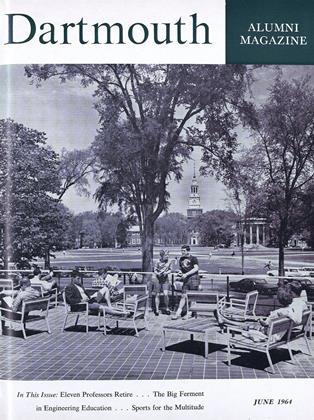Two points need to be made with respect to the ferment in engineering education which is to be found on most of the campuses where engineering is being taught and which is reported in Dave Allison's fine article.
In reading the article one gains the impression that the choice is between a scientific-oriented curriculum and a design-oriented curriculum. Our experience leads us to believe that a reasonable introduction to the problems of invention and innovation, within the constraints imposed by consumer willingness to pay, generates student interest in scientific matters. For example, when our students were asked to design a power pack for a bicycle they became interested in the efficiencies of electric motors. They were disturbed by the low efficiencies and therefore wanted to know why the efficiencies of these motors were low. This led several students to become interested in the problem of friction between the carbon brushes and the commutator. This m turn heightened their interest in scientific principles because without scientific principles it is impossible to see what to do to improve the efficiency of these motors. Again, in last year's project, dealing with water purification, the students found it necessary to teach themselves some of the basic principles so they could compare the different water separation processes. The story is repeated again at a higher level when our students do their fifth-year engineering theses. Indeed, some of our students find it desirable to take courses that they would not otherwise have taken so that they may have a stronger scientific basis from which to work on their design projects.
The second point that needs to be made and which is not discussed at all in Dave Allison's article is the importance of a liberal education. Because engineering works are made for people and to satisfy human wants and desires, it is necessary for the engineer to have an appreciation of what human needs have been in the past and what they are likely to be in the future. If engineers are to play a significant role in the future, they must be educated not merely as technicians but as full citizens. Thus far, only Dartmouth, Harvard, and Yale seem to have given serious consideration to this side of the engineer's education. At Dartmouth we are moving to institute courses m which social and technical interactions are the prime concern. The fact that this point is not reported to be part of the nationwide "ferment" is a cause of concern for all of us.
Dean of the Thayer School
 View Full Issue
View Full Issue
More From This Issue
-
 Feature
FeatureThe Big Ferment in Engineering Education
June 1964 By DAVID ALLISON, -
 Feature
FeatureA Teacher's Real Reward
June 1964 -
 Feature
FeatureSports for the Multitude
June 1964 By LARRY GEIGER '66 -
 Article
ArticleTHE UNDERGRADUATE CHAIR
June 1964 By DAVE BOLDT '63 -
 Class Notes
Class Notes1920
June 1964 By CHARLES F. MCGOUGHRAN, JHON S. MAYER -
 Class Notes
Class Notes1930
June 1964 By WALLACE BLAKEY, ARTHUR M. BROWNING
Article
-
 Article
ArticleENGAGEMENTS OF PRESIDENT NICHOLS
December, 1914 -
 Article
ArticleMasthead
Jan/Feb 2003 -
 Article
ArticleTuck School
June 1947 By G. W. Woodworth, H. L. Duncombe Jr. -
 Article
ArticleWARNING TO A FOETUS
April 1945 By Ted Boorum '40 -
 Article
ArticleHAS HUMOROUS SIDE
May 1935 By W. J. Minsch Jr. '36 -
 Article
ArticleTwo Sides to Science
January 1952 By WILLIAM W. BALLARD '28

